Unit2 Topic3知识点总结
仁爱版英语八年级上册Unit 2 Topic 3 重难点知识归纳总结
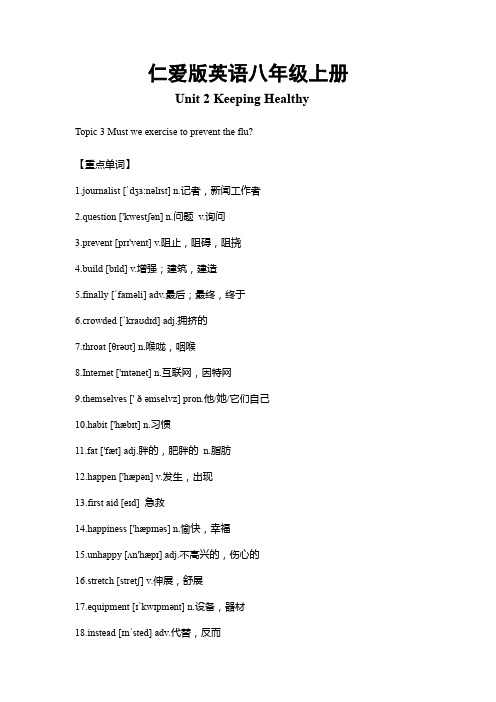
仁爱版英语八年级上册Unit 2 Keeping HealthyTopic 3 Must we exercise to prevent the flu?【重点单词】1.journalist [ˈdʒɜ:nəlɪst] n.记者,新闻工作者2.question ['kwestʃən] n.问题v.询问3.prevent [prɪ'vent] v.阻止,阻碍,阻挠4.build [bɪld] v.增强;建筑,建造5.finally [ˈfaɪnəli] adv.最后;最终,终于6.crowded [ˈkraʊdɪd] adj.拥挤的7.throat [θrəʊt] n.喉咙,咽喉8.Internet ['ɪntənet] n.互联网,因特网9.themselves [' ð əmselvz] pron.他/她/它们自己10.habit ['hæbɪt] n.习惯11.fat ['fæt] adj.胖的,肥胖的n.脂肪12.happen ['hæpən] v.发生,出现13.first aid [eɪd] 急救14.happiness ['hæpɪnəs] n.愉快,幸福15.unhappy [ʌn'hæpɪ] adj.不高兴的,伤心的16.stretch [stretʃ] v.伸展,舒展17.equipment [ɪˈkwɪpmənt] n.设备,器材18.instead [ɪnˈsted] adv.代替,反而19.choose [tʃu:z] v.选择;挑选20.energy [ˈenədʒi] n.精力,活力,干劲【重点短语】1.go ahead (尤指经某人允许)开始,开始做;走在前面2.build sb up 增强某人的体质3.all the time 一直4.on the other hand 另一方面5.instead of 代替6.talk with 与……交谈7.keep away from 远离8.take the advice 采纳建议;听从劝告9.take pills 吃药10.ring sb up 打电话给某人11.give a talk 作报告;做演讲12.in order to 为了13.do exercise 锻炼14.do some cleaning 做清洁工作15.warm up 热身【重点句型】1.Sure, go ahead. 当然可以,请问吧!2.—Must we take some medicine to prevent the flu? 我们一定要吃点药来预防流感吗?—No, we don’t have to. / No, we needn’t. 不,我们不必要那样做。
初中英语 仁爱版八年级上册Unit 2 Topic 3知识点
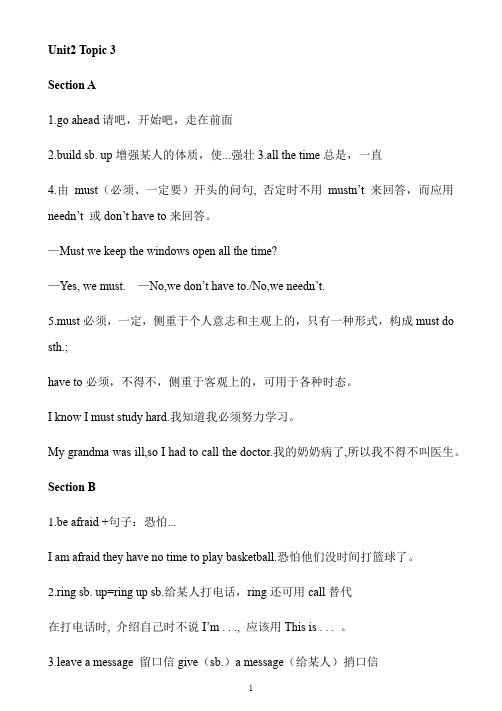
Unit2 Topic 3Section A1.go ahead请吧,开始吧,走在前面2.build sb. up增强某人的体质,使...强壮3.all the time总是,一直4.由must(必须、一定要)开头的问句, 否定时不用mustn’t 来回答,而应用needn’t 或don’t have to来回答。
—Must we keep the windows open all the time?—Yes, we must. —No,we don’t have to./No,we needn’t.5.must必须,一定,侧重于个人意志和主观上的,只有一种形式,构成must do sth.;have to必须,不得不,侧重于客观上的,可用于各种时态。
I know I must study hard.我知道我必须努力学习。
My grandma was ill,so I had to call the doctor.我的奶奶病了,所以我不得不叫医生。
Section B1.be afraid +句子:恐怕...I am afraid they have no time to play basketball.恐怕他们没时间打篮球了。
2.ring sb. up=ring up sb.给某人打电话,ring还可用call替代在打电话时, 介绍自己时不说I’m . . ., 应该用This is . . . 。
3.leave a message 留口信give(sb.)a message(给某人)捎口信take a message to sb.=give a message to sb.给某人传口信4.tell sb.to do sth.告诉某人做某事tell sb. not to do sth.告诉某人不要做某事The teacher tells us to clean the classroom.老师告诉我们去打扫教室。
七年级英语Unit2 Topic 3—Unit3 知识点汇总
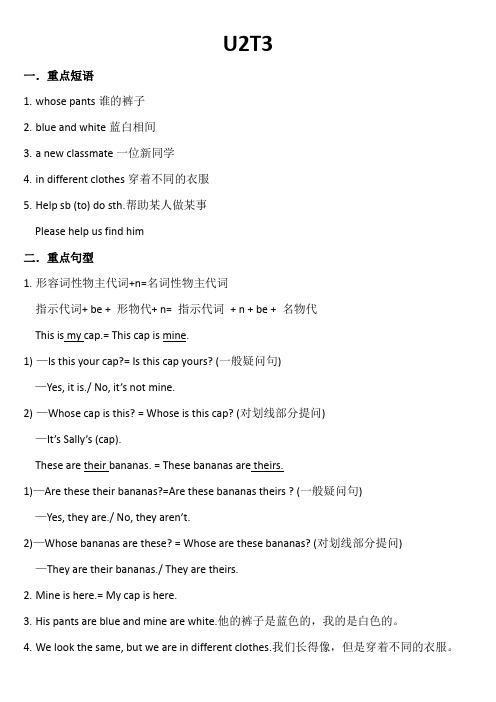
U2T3一.重点短语1.whose pants谁的裤子2.blue and white蓝白相间3.a new classmate一位新同学4.in different clothes穿着不同的衣服5.Help sb (to) do sth.帮助某人做某事Please help us find him二.重点句型1.形容词性物主代词+n=名词性物主代词指示代词+ be + 形物代+ n= 指示代词+ n + be + 名物代This is my cap.= This cap is mine.1)—Is this your cap?= Is this cap yours? (一般疑问句)—Yes, it is./ No, it’s not mine.2)—Whose cap is this? = Whose is this cap? (对划线部分提问)—It’s Sally’s (cap).These are their bananas. = These bananas are theirs.1)—Are these their bananas?=Are these bananas theirs ? (一般疑问句)—Yes, they are./ No, they aren’t.2)—Whose bananas are these? = Whose are these bananas? (对划线部分提问)—They are their bananas./ They are theirs.2.Mine is here.= My cap is here.3.His pants are blue and mine are white.他的裤子是蓝色的,我的是白色的。
4.We look the same, but we are in different clothes.我们长得像,但是穿着不同的衣服。
5.I think....我想...(表主观推测)I think it’s Kangkang’s.我想它是康康的三.重点语法表示所属关系(1)名词性物主代词=形容词性物主代词+名词形容词性物主代词my your his her our their its名词性物主代词mine yours his hers ours theirs its--Whose is this pen? Is it yours?--No, it’s not mine. My pen is blue.(2)名词所有格1) 用于人或其他表示有生命的名词后:•单数或不以s结尾的复数+’s,如:Jane’s book;Women’s Day•以s结尾的复数+’如:Teachers’Day•Lucy’s and Lily’s bags 分有Lucy and Lily’s room 共有Those are Jane’s shoes.= Those shoes are Jane’s.2) of 表示所属关系,用于没有生命的物体,如:a map of China;a photo of my familyU3T1一.重点短语1.tell sb. sth. = tell sth. to sb. 告诉某人某事tell sb. about sth. 告诉某人关于某事Please tell me your name. = Please tell your name to me.Please tell Maria about it. 请把这件事告诉玛丽亚吧。
仁爱版九年级英语上册Unit 2 Topic 3知识点总结

do sth oneself:自己做某事
31
cry for help
哭救
32
after all
毕竟
常放句首,其后加“逗号”
33
produce power from coal
从煤炭中产生能量
produce sth from sth:从…中生产出…
34
acid rain
酸雨
35
nuclear power
39
reach a speed of…
达到一个..的速度
The train can reach a top speed of 431 km per hour.
40
per hour
每小时
41
energy sources
能源
42
renewable sources
可再生能源
43
run out
用尽
44
provide wood tobuildhouses
2、用法:
①表示并列关系的连词有:and和both...and...二者都;either...or...或者···或者···;neither...nor...既不···也不···;as well as也;not only...but (also)...不但···而且···
②表示选择关系的连词:or或者or else否则;otherwise否则;neither...nor...既不···也不···;either...or...或者···或者···
9
plastic bags
塑料袋
10
save money
省钱;存钱
11
encourage sb to do sth
最新仁爱九年级英语上册Unit 2 Topic 3 知识点归纳与练习
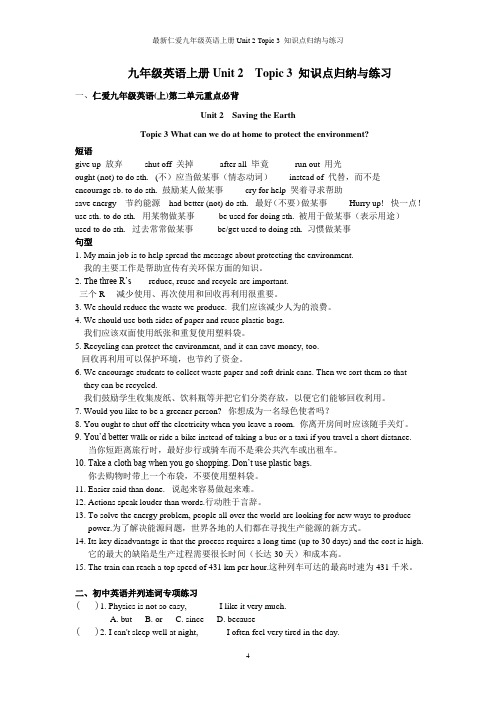
九年级英语上册Unit 2 Topic 3 知识点归纳与练习一、仁爱九年级英语(上)第二单元重点必背Unit 2 Saving the EarthTopic 3 What can we do at home to protect the environment?短语give up 放弃shut off 关掉after all 毕竟run out 用光ought (not) to do sth. (不)应当做某事(情态动词)instead of 代替,而不是encourage sb. to do sth. 鼓励某人做某事cry for help 哭着寻求帮助save energy 节约能源had better (not) do sth. 最好(不要)做某事Hurry up! 快一点!use sth. to do sth. 用某物做某事 be used for doing sth. 被用于做某事(表示用途)used to do sth. 过去常常做某事be/get used to doing sth. 习惯做某事句型1. My main job is to help spread the message about protecting the environment.我的主要工作是帮助宣传有关环保方面的知识。
2. T he three R’s------reduce, reuse and recycle are important.三个R----减少使用、再次使用和回收再利用很重要。
3. We should reduce the waste we produce. 我们应该减少人为的浪费。
4. We should use both sides of paper and reuse plastic bags.我们应该双面使用纸张和重复使用塑料袋。
5. Recycling can protect the environment, and it can save money, too.回收再利用可以保护环境,也节约了资金。
九年级上册英语u2t3知识点总结

九年级上册英语u2t3知识点总结Unit 2, Topic 3 Knowledge Review: A Comprehensive SummaryIntroduction:In this article, we will delve into a comprehensive summary of the key concepts covered in Unit 2, Topic 3 of the 9th-grade English textbook. The aim is to revisit and consolidate our understanding of the important points discussed. Let's begin!Vocabulary Expansion:To effectively communicate in English, it is essential to possess a strong vocabulary base. Topic 3 introduced us to several new words, such as 'consult,' 'quaint,' 'awkward,' 'potential,' 'impose,' and'reminiscent.' Understanding the meanings and usage of these words enables us to express ourselves more fluently and precisely.Common Mistakes to Avoid:During the course of learning English, we often encounter certain mistakes that are worth noting. In Topic 3, we focused on two such errors: improper usage of prepositions and confusing verb tenses.Prepositions: A common mistake is the incorrect use of prepositions, such as 'on,' 'at,' and 'in.' For example, we say "I am at home" rather than "I am in home." Knowing when to use the correct preposition not only enhances the clarity of our sentences but also showcases our language proficiency.Verb Tenses: Another frequent error lies in the confusion of verb tenses, particularly the present simple and present continuous tenses. We use the present simple to describe general truths or routines, while the present continuous tense signifies an action happening at the moment of speaking or in the near future. Being mindful of these distinctions helps us convey our intended message accurately.Idioms and Expressions:Idioms and expressions are an integral part of any language. They add color and depth to our communication. Topic 3 introduced us to a few idioms and expressions such as 'take the plunge,' 'give it a shot,' and 'miss the point.' Understanding and incorporating these idioms into our speech can potentially make our English conversations more engaging and natural.Reading Comprehension:Reading comprehension is a crucial skill that aids in understanding written texts. In Topic 3, we practiced this skill through various reading exercises. It's important to adopt effective strategies such as scanning for keywords, understanding context, and making inferences while reading. These techniques not only improve our understanding but also enhance our reading speed.Writing Skills:Developing strong writing skills is essential for effective communication. In Topic 3, we learned about different elements that contribute to good writing, such as cohesive devices and appropriate paragraphing.Cohesive Devices: Cohesive devices like conjunctions, transition words, and linking phrases help connect ideas and make our writing flow smoothly. Examples of these include 'however,' 'therefore,''moreover,' and 'in contrast.' Utilizing these devices appropriately in our writing enhances coherence and organization.Paragraphing: Proper paragraphing is crucial in structuring our writing effectively. Each paragraph should focus on a specific topic or idea and begin with a clear topic sentence. Ensuring unity and coherence within each paragraph creates a cohesive piece of writing.Conclusion:As we conclude this knowledge review of Unit 2, Topic 3, it is paramount to revisit these key concepts from time to time to cement our understanding of the English language. By expanding our vocabulary, avoiding common mistakes, utilizing idioms and expressions, mastering reading comprehension, and developing strong writing skills, we will continue to enhance our proficiency in English. Keep practicing and exploring the language!。
Unit2Topic3知识点总结仁爱版英语八年级上册

U2Topic3总结单词journalist记者question问题prevent预防/阻止change更换/变化crowded拥挤的sore疼痛fat肥胖的happiness快乐important重要的cool酷/凉爽stretch伸展equipmeng【U】器材/设备choose选择(chose) instead反而/然而Internet网络habit习惯unhappy不开心throat喉咙finally最终first aid急救happen发生instruction s说明书except除……之外athlete运动员suitable适合的advise v.建议advice n.建议【U】词性变化crowd n.人群-crowd ed adj.拥挤的; happy adj.开心-un happy adj.不开心-happ iness n.快乐care v/n.关心-care ful adj.小心/仔细-care fully adv.小心/仔细地instruct v.指导-instruc tions n. 说明书suit n.套装/v.适合-suit able adj.适合的主格宾格形容词性物主代词名词性物主代词反身代词反身代词常用搭配I 我me My Mine myself 自学learn sth by oneself=teach oneselfhe 他him his his himself 伤到自己hurt oneselfshe 她her her hers herself 玩得开心Enjoy oneselfit 它it its its itself 自取help oneself towe 我们us our ours ourselves 亲自by oneselfthey他们them their theirs themselvesyou 你you your yours yourselfyou 你们you your yours yourselves短语prevent/stop/keep sb from doing sth阻止某人做某事ask some questions问一些问题build sb up 增强某人体质all the time一直change clothes often经常更换衣服keep away from crowded places远离拥挤的地方take one’s advice采纳某人的建议keep the air fresh保持空气新鲜prevent the flu预防流感take some cold pills吃感冒药work on the Internet too long在网上工作太长时间play sports too much过量运动eat hot food吃辛辣的食物be busy doing忙于做某事ring sb up打某人电话(rang)leave a message for sb给某人留言(left) tell sb (not) to do告诉某人(不)去做某事(told) forget to do忘记去做(forgot) give a talk演讲(gave) be on time准时Watch TV too much 看电视太多by oneself独自一人ask sb for help请求某人帮助have problems oneself自己有问题with the help of在某人的帮助下have healthy eating habits有健康的饮食习惯stay safe保持安全learn about first aid了解急救be important for/to对……重要on one hand, on the other hand一方面,另一方面stay away from远离say no to 拒绝(said) have to do不得不warm up 热身stretch your legs伸展双腿a good place to do做某事的好地方exercise equipment运动器材instead of (doing)而不是keep cool保持清凉(kept)in order to为了be suitable for对……适合advise sb to do建议某人去做某事必背句子1.What should we do to prevent the flu? 为了预防流感,我们应该做什么?2.May I ask you some questions?-Sure,go ahead. 我能问你一些问题吗?当然可以,问吧。
Unnit2Topic3知识点-初中英语八年级上册

八上 Unit 2Topic 3 Must we exercise to prevent the flu?Section A1.talk with sb 和某人谈论2.May I ask you some questions?我能问你一些问题吗?3.go ahead 继续4.have the flu 患流感5.We should exercise often to build us up.我们应该经常锻炼去增强体质。
build sb up 增强某人的体质6.We should keep our rooms clean and the air fresh all the time.我们应该一直使我们的房间干净,空气清新。
keep sb/sth+ adj. 使…怎样的all the time 一直7.keep away from 远离8.at once 立刻,马上9.take one’s advice 采取某人的建议advice(n)建议—advise(v)advise sb to do sth 建议某人做某事10.take some medicine 吃一些药11.prevent the flu 防止流感12.Must we exercise to prevent the flu? 我们必须锻炼身体预防流感吗? Yes, we must. // No, we don’t have to./ No, we needn’t.13.boiled water 开水14.lie down 躺下15.take/have a good rest 休息Section B1.Could I speak to XXX? 我能和XXX说话吗?2.I’ am afraid he is busy right now. 恐怕他现在很忙。
right now 现在/立刻be busy doing sth 忙于做某事3.I’ll ring him up later. 我稍后打给他。
2015-2016仁爱九年级Unit2topic3Saving-the-Earth重点语言知识点总结

Unit2 Topic 3What can we do at home to protect the environment语法重点:并列句:是由并列连词把两个或两个以上的简单句连在一起构成的句子,连词前可用逗号,也可不用逗号。
通常由and,but,while,or,so等连词来连接。
如:1.表示并列关系,动作先后关系,常用连接词有and, not only…but also…等。
如:His father is a teacher and his mother is a doctor.他的父亲是一位老师,母亲是一位医生。
Mr. Green can not only drive a car but also repair it.格林先生不但会开车而且还能修车。
2.表示转折,常用连词有but, while等。
如:I bought my sister a present, but she didn’t like it.我给妹妹买了一件礼物,但是她并不喜欢。
Tom does housework every day while his sister does nothing.汤姆每天都做家务活,而他的妹妹什么也不做。
3.表示选择关系,常用连词有or, either…or…等。
如:He speaks French, or perhaps he understands it. 他会讲法语,或者懂法语。
Either he could not come or he did not want to. 他要么是不能来要么是不想来。
4. 表示因果关系,常用连词有so, for等。
如:Her mother is ill, so she has to stay at home and look after her mother.她母亲病了,所以她不得不呆在家里照看她。
The ground is very wet, for it rained last night. 地面很湿,因为昨晚下雨了。
Unit2Topic3语言点归纳

Topic 3 Let’s be greener people.一、重点词汇(一)词形变换1. organization(动词) organize (动名词) recycling3. follow(形容词) following (形容词) electric5. move(名词) movement6. quick(副词) quickly7. environment(形容词) environmental 8. protect(名词) protection(二)重点词组1.environmental protection 环境的保护2.work for… 为……工作3.spread message about… 宣传有关……4.reduce the waste/ air pollution 减少浪费/ 空气污染5.both sides of … ……的两面6.rather than (是)……而不是….7.not only…but also… 不仅…….而且……8.save money/ energy/ electricity 省钱/ 能源/ 电9.be supposed to do sth. 应当做某事10.travel a short distance 短途旅行11.put…into… 把……放入……12.take up a lot of space 占据许多空间13.produce power from… 从……获得能量14.run the car 发动汽车15.push…forward /up /down 推…….向前/向上/向下16.power machines 发动机器17.produce electricity by doing sth. 通过做某事发电18.the movement of water 水的流动19.be used for doing sth 被用作做某事20.take a quick shower 快速淋浴21.make a short journey 短途旅行22.pick the litter up 捡起垃圾23.try harder 再努力24.produce a short oral report 作一个简短的口头报告二、重点句型1.Let’s be greener people. 让我们做环保使者吧。
仁爱版英语九年级上册Unit 2 Topic 3知识点
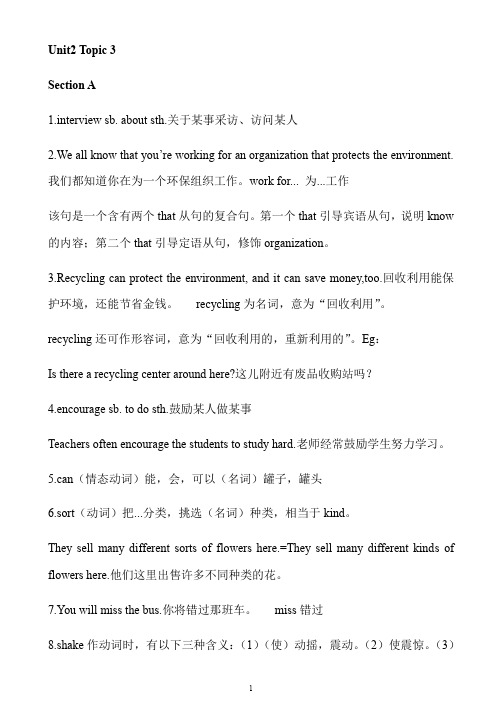
Unit2 Topic 3Section A1.interview sb. about sth.关于某事采访、访问某人2.We all know that you’re working for an organization that protects the environment.我们都知道你在为一个环保组织工作。
work for... 为...工作该句是一个含有两个that从句的复合句。
第一个that引导宾语从句,说明know 的内容;第二个that引导定语从句,修饰organization。
3.Recycling can protect the environment, and it can save money,too.回收利用能保护环境,还能节省金钱。
recycling为名词,意为“回收利用”。
recycling还可作形容词,意为“回收利用的,重新利用的”。
Eg:Is there a recycling center around here?这儿附近有废品收购站吗?4.encourage sb. to do sth.鼓励某人做某事Teachers often encourage the students to study hard.老师经常鼓励学生努力学习。
5.can(情态动词)能,会,可以(名词)罐子,罐头6.sort(动词)把...分类,挑选(名词)种类,相当于kind。
They sell many different sorts of flowers here.=They sell many different kinds of flowers here.他们这里出售许多不同种类的花。
7.You will miss the bus.你将错过那班车。
miss错过8.shake作动词时,有以下三种含义:(1)(使)动摇,震动。
(2)使震惊。
(3)(身体)颤抖,发抖,哆嗦。
作名词时,意为“摇动,抖动,颤动”。
仁爱英语八上Unit2Topic3重要知识点归纳

志远教育培训中心Unit 2 Topic 3一、重点词组 :1.talk with/to sbtalk about sth2.ask questions3.prevent sb (from) doing sth4.all the time= always5.build sb up6. don ’thave to / needn’t7. take/follow one’sadvice8.go to crowded places9.work on the internet too long10.May/Can/Could I speak to sb?11.be afraid of sth beafraid to do sthbe afraid + (that)从句12.right now = at once= in a minuteright now= now = at the moment13.ring sb up= call sb= call sb up = give sb a call14.be busy doing sth= be busy with sth15.leave a message (to sb)take a message (for sb)give sb a message16.go ahead17.forget to do sthforget doing sth18.give a talkgive sb a talk =give a talk to sbgive a talk about⋯. to sb19.make sb fat and unhealthy20.sth happen to sb Sbhappen to do sth21.have a trytry to do sthtry doing sth22.stay/keep safeStay/keep healthyStay/keep away from23.learn about first aid24.on one hand ⋯ on the other hand25.be happy to be healthy26.cause cancer/ illnesses27.say no to (doing) sth28.sb isn ’tin= sb is out29.stop doing sthstop to do sth与⋯⋯交谈谈论某事问问题阻止某人做某事总是 /一直增强某人体质不必听从某人建议去人群拥挤的地方在网上工作太久我可以 /能找某人接听电话吗?害怕做某物害怕做某事恐怕⋯.立即,马上此刻,目前给某人打电话忙于某事留口信 (给某人 )(为某人 )捎口信给某人口信开始吧,请便忘记做某事 (还没做 )忘记做过某事(已经做过了 )做报告给某人做报告给某人做关于⋯的报告使某人肥胖和不健康某事发生在某人身上某人碰巧做某事试一试努力做某事试着做某事保持安全保持健康远离了解急救知识一方面⋯ 另一方面想健康就得快乐, 快乐才能健康引发癌症 /疾病拒绝 (做 )某事某人不在停止做某事停下来去做某事志远教育培训中心stop sb from doing sth30. warm up31. exercise equipment32. instead of +n/v-ing33. get your body moving34. healthy eating/ living habits35. in order to +动词原形= so that +句子阻止某人做某事热身运动器材代替,而不是使你的身体动起来健康的饮食 /生活习惯为了二、重点句型1.What should we do to prevent it? 为了预防流感我们应该做什么?2.I ’m afraid he is busy right now.恐怕此刻他很忙.3.Please tell my father not to forget the talk tomorrow afternoon.请告诉我父亲不要忘了明天下午的报告.4.I ’ll give him the message myself 我会亲自告诉他信息的5. It ’s necessary to learn about first aid. 了解急救知识是必需的6.Happiness is important for your health快乐对你的健康很重要7.In order to keep healthy, we should ⋯为了保持健康,我们应该8.The more exercise, the better锻炼越多,越好⋯9.We should say no to smoking and drinking我们应该拒绝吸烟和喝酒10.If you hurt yourself while you are exercising, rest until you feel better.如果你在锻炼的时候伤到了自己,那么休息直到你感觉好一些.三.重点语言点1.talk with sb.表“与⋯⋯ 交流” ,指“与人平等地交流、讨论”talk to sb.表示“找某人谈话” ,在口语中常“责备某人”如 : Jim ’s father is talking with the teacher.吉姆的父亲正在和老师交谈.I will talk to him about his careless.我要找他谈话,批评他的粗心大意.2. 常用的反身代词词组:take care of oneself = look after oneself照顾某人自己teach oneself sth = learn sth by oneself自学enjoy oneself = have a good time玩得高兴help oneself to sth请随便吃⋯leave sb by oneself = leave sb alone把某人单独留下say to oneself自言自语hurt oneself摔伤自己lose oneself in沉浸于⋯3. 情态动词 : must与have to① must"必须;一定”,表示有做某一动作的必要或义务, 侧重表达说话者的主观看法有一种时态)如:We must wash hands before meals.饭前我们必须洗手.(.只We must eat healthy food.我们必须吃健康的食物.②have to “不得不 , 必须”, 侧重表示因客观条件或客观环境的迫使而"不得不做某事".(可用于各种时态)如: It ’s too late.I have to go now.太迟了.现在我得走了.I had to borrow some money at that time.那时我不得不借了一些钱.*----Must we keep the windows open all the time?---No, we don ’ t have to. / No, we needn’ t. (注意回答时不能用No, we mustn ’ t.)。
Unit 2 Topic 2 ---3重难点知识归纳总结2021-2022学年仁爱版英语八年级上册
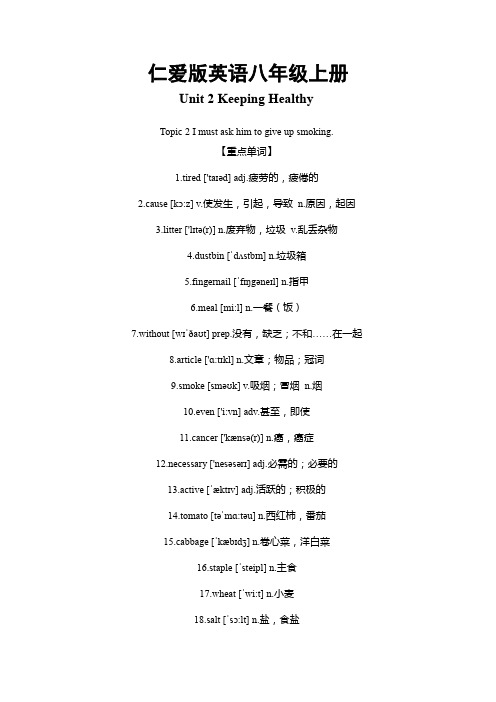
仁爱版英语八年级上册Unit 2 Keeping HealthyTopic 2 I must ask him to give up smoking.【重点单词】1.tired ['taɪəd] adj.疲劳的,疲倦的2.cause [kɔ:z] v.使发生,引起,导致n.原因,起因3.litter ['lɪtə(r)] n.废弃物,垃圾v.乱丢杂物4.dustbin [ˈdʌstbɪn] n.垃圾箱5.fingernail [ˈfɪŋgəneɪl] n.指甲6.meal [mi:l] n.一餐(饭)7.without [wɪˈðaʊt] prep.没有,缺乏;不和……在一起8.article ['ɑ:tɪkl] n.文章;物品;冠词9.smoke [sməʊk] v.吸烟;冒烟n.烟10.even ['i:vn] adv.甚至,即使11.cancer ['kænsə(r)] n.癌,癌症12.necessary ['nesəsərɪ] adj.必需的;必要的13.active [ˈæktɪv] adj.活跃的;积极的14.tomato [təˈmɑ:təu] n.西红柿,番茄15.cabbage [ˈkæbɪdʒ] n.卷心菜,洋白菜16.staple [ˈsteipl] n.主食17.wheat [ˈwi:t] n.小麦18.salt [ˈsɔ:lt] n.盐,食盐19.sugar [ˈʃugə] n.食糖20.illness [ˈɪlnəs] n.疾,疾病21.weak [wi:k] n.虚弱的,无力的22.cream [kri:m] n.奶油,乳脂23.ice cream 冰淇淋24.force [fɔ:s] v.强迫,迫使25.childhood [tʃaildhud] n.童年,幼年26.plate [pleɪt] n.盘子,碟子;一盘27.mad [maid] adj.疯的28.taste [teɪst] v.尝,品;吃n.味道29.surprise [səˈpraɪz] v.使惊奇,使诧异n.惊奇,惊讶30.watermelon [ˈwɔ:təmelən] n.西瓜31.potato [pəˈteɪtəʊ] n.土豆,马铃薯32.sandwich ['sænwɪdʒ] n.三明治(夹心面包片)33.strawberry ['strɔ:bərɪ] n.草莓34.beef [bi:f] n.牛肉35.biscuit [biskit] n.饼干36.such [sʌtʃ] pron.这样的,那样的,类似的37.etc [etsetərə] abbr.等等,以及其他38.fact [fækt] n.事实,真相;现实39.unhealthy [ʌn'helθɪ] adj.不健康的40.chemical [kemikl] n.化学品41.cigarette [sigəret] n.香烟,纸烟42.body ['bɒdɪ] n.身体43.disease [dɪˈzi:z] n.病,疾病44.harm [ha:m] v.&n.危害,伤害,损害45.smoker [sməʊkə] n.吸烟者46.second-hand adj. 二手的,旧的47.risk [risk] n.危险,风险v.(使)冒……的风险48.possible [pɔsəbl] adj.可能;能做到【重点短语】1.in fact 事实上,实际上2.as... as possible 尽量……地3.give up 放弃4.stay up late 熬夜5.be bad for 对……有害6.put... into... 把……放进……7.get up 起床8.be good for 有利于9.take a walk 散步10.have a bath 沐浴11.force sb to do sth 强迫某人做某事12.leave for 动身去,出发前往【重点句型】1.Staying up late is bad for your health. 熬夜对你的健康有害。
仁爱英语八上Unit 2 Topic 3知识点归纳

Unit 2 Topic 3Section A一词组go ahead开始,build sb. up增强某人的体质, all the time一直, keep away from 远离,,at once =right away立刻、马上,take one's advice 接受某人的建议,take a rest=have a rest 休息,go to crowded places,到人群拥挤的地方二语言点1.Must we.........?的肯定回答:Yes,We must. 否定回答:No, We don't have to./No,We needn't.2.不定式作状语表示目的如:We must exercise to prevent the flu. we should exercise often to build us up.3.keep sb./sth. 形容词如:keep our rooms clean/keep the air fresh.Section B一词组ring sb. up=call sb.up 给某人打电话,leave a message for sb. 给某人留口信,right now. 此刻、目前,give a talk.作报告,on time 准时,with the help of =with one's help在某人的帮助下,give sb. a message给某人留个口信,do some cleaning大扫除be free=have time 有空、有时间, by oneself=alone 独自地二,语言点1.反身代词(oneself):反身代词会随着主语的变化而变化,参看P492.tell sb. (not)to do sth.告诉某人(不要)做某事3.need 可以作实义动词也可以作情态动词作实义动词时有时态和人称的变化用法:need to do sth./sth. 如: I need to relax ——否定句:I don't need to relax. 作情态动词没有时态和人称变化用法:need do sth. 如: Kangkang need have a rest.——否定句Kangkang needn't have a rest.Section C一词组eating habit 饮食习惯,try to do sth.尽力做某事,first aid 急救,on the other hand 在另一方面,stay away from =keep away from 远离……, say no to ...对……说不...,in order to do sth.为了做某事,stay safe 保持安全,be important to 对……重要二语言点1.it is +形容词+for sb. to do sth.对于某人来说做某事怎么样如:it's important for you to exercise every day.it is +形容词+of sb. to do sth.=sb .be +形容词+to do sth. 这时候句中的形容词必须是描述人的性格或品质的形容词(clever,kind,good,nice等)如: it's kind of you to help me=you are kind to help me.Section D一词组warm up热身,instead of 代替,而不是,,exercise equipment锻炼器材,be hurt受伤二语言点1.the more exercise, the better.锻炼越多,身体越好2.Stop to do sth停下来做另一件事,Stop doing sth停止正在做的事情3.drinking while playing sports is bad for our health=drinking while( we are )playing sports is bad for our health.当你进行体育活动时喝酒对我们的健康不利。
仁爱英语八年级上册Unit2-topic3知识点总结

Unit2 Keeping healthyTopic3 Must we exercise to prevent the flu?一、重点短语1. hurry up 快点,赶快2. go ahead(尤指经某人允许)开始,干下去,走在前面,领先3. do more exercise 多锻炼4. do some cleaning 做扫除5. all the time 一直6. have to 不得不,必须7. keep away 远离...8. just a moment 稍等一会儿9. get through 拨通(电话);通过10. take care of 照顾11. care for 照顾(病人);照料;喜欢12. talk with 和...交谈13. enjoy oneself 过得愉快14. Chinese medicine 中药15. since then 从那时起16. get lost 丢失了,迷路17. on one's way to... 在某人去...的路上18. by mistake 错误地19. ask for leave 请假20. healthy food 健康食物21. crowded places 拥挤的地方22. do one`s best 尽力23. change clothes often 常换衣服24. wash hands often 常洗手25. ring...up 打电话给...26. leave a message 留口信27. take a message 带口信28. call...back 给...回电话29. take an active part in 积极参加30. the name of... ...的名称31. what do you think of...? 你认为...怎么样?32. have a good time=enjoy oneself 过得愉快33. next time 下次34. let...out 让...出去35. teach oneself on the Internet 网上自学36. be afraid of 害怕...,恐惧...二、重点句型Section A1. Mom, hurry up ! Dad is on TV.①hurry up 赶快,表催促②hurry to do sth. = do sth. in a hurry 匆忙地做某事He hurried to finish the work. = Hefinished the work in a hurry.③ hurry to+某地:表匆匆地去某地,如:He hurried to the hospital.= He went to the hospital in a hurry. (2) be on TV 某人或某事物上电视。
仁爱版九年级上册英语-Unit2:Topic3单词汇总+知识梳理

仁爱九上-Unit2 Topic3知识梳理【重点短语】1.environmental protection 环境保护2.work for 为……而工作3.both sides of paper 纸的两面4.plastic bags 塑料袋5.encourage sb. to do sth. 鼓励某人做某事6.ought to do sth.应该做某事7.shut off 关闭8.instead of + n./pron./v-ing代替,而不是9.after all 毕竟,归根结底10.renewable energy 可再生能源11.in people’s everyday/daily lives在人们的日常生活中12.require sb. to do sth. 要求某人做某事be required to do sth. 被要求做某事13.i n the near future 在不久的将来14.r each a top speed of…达到最高时速……15.r un out 用完,耗尽16.r emove…from…把……从……除去17.h urry up 赶快,快点18.give up 放弃19.though/although/even though even if 虽然,尽管.引导让步状语从句,不能和but 连用,但可与yet,still 连用。
【词形转换】1.protect v.保护protection n.保护,防卫2.agree v.同意agreement n.同意,一致,协议disagreement n.分歧,争论3.electric adj.用电的,电动的 n.带电体,电动车辆electricity n.电,电能4.cloth n.织物,布料clothes n.衣服5.German n.德国人,德语 adj.德国的,德国人的,德语的Germany n.德国6.dry adj.干燥的,雨少的,干性的v.使……干,弄干,擦干drier n.烘干机,吹风机drily adv.干燥地7.plant v.种植planter n.种植园主8.marry v.嫁,娶,结婚married adj.已婚的,有配偶的9.weigh v.称……重量weight n.重量,分量10.h istory n.历史historical adj.历史的11.d ifferent adj.不同的difference n.[C]差别,差异【重点句型】1.Recycling can protect the environment, and it can save money, too.回收可以保护环境并且可以节约钱。
Unit2 Topic 3 知识总结:仁爱版九年级上册英语

plastic塑料的[]n.塑胶, 可塑体, 塑料制品, 整形adj.塑胶的, 塑造的, 有可塑性的, 造形的, (外科)整形的stick木棒(棍),枝条粘住,钉住;坚持8上chopstick筷子8下stick粘住,钉住;坚持;木棒(棍);枝条9上encourage鼓励encourage[i]vt.鼓励, 激励, 怂恿;赞助, 促进, 助长encourage sb. to do sth.鼓励某人(做某事)encourage a man to work better鼓励一个人更好地工作be encouraged by受...鼓励[鼓舞]encouraging adj.鼓励的, 给予希望的, 振奋人心的, 令人欢欣鼓舞的-ginglyencourage encourager n. encouragement n.记忆方法:courage[]n.勇气, 精神discourage[]vt.使气馁, 阻碍encourage en-使有鼓励can[](美)罐子;罐头vt.装进罐中, 把食品装罐n.罐头, 铁罐conj.能, 可以suppose猜想,假定,料想suppose[]vt.想, 设想, 猜测; 认为, 以为;包含, 意味着; 必须有, 以...为必需条件[用于祈使语气]让, ...如何, ...怎么样;(=if)[口]如果I suppose you are right.我想你说得对。
Let's suppose (that) the news is true.让我们假定这消息是真的。
S-your father saw you now, what would you say?假设你父亲现在看到了你, 你该怎么说?suppose[]vi.推测, 猜想I suppose so.我想是的。
Suppose n.想象; 推测supposable adj. supposer n.supposesup- =sub-在…下面+ pose 放着[]n.姿势, 姿态v.(使...)摆好姿势, 形成, 引起, 造成vi.摆姿势, 佯装, 矫揉造作形近词:purpose目的,意图9上pose[];nod点头nod[n d]vi.(nodded; nodding)点头(表示同意或打招呼);打盹, 瞌睡;不专心、不留意而失误(树梢、花等)摇曳; 摆动;(建筑物)倾斜;nod to sb.向某人打招呼nodding in an armchair坐在椅子上打瞌睡Flowers nod in the breeze.花在微风中摇动。
最新仁爱版英语八年级上册Unit2 Topic3知识点 完整版

Unit2 Topic3SectionA语法1.must和have to 的区别:have to表示客观must表主观must 引导的一般疑问句,肯定回答:Yes,we must.否定回答:No,we needn’t /No, we don’t have to2.反身代词:第一人称(单)myself(复)ourselves第二人称(单)yourself(复)yourselves第三人称(单)himself herself itself(复)themselves1.和某人谈论某事talk with sb. about sth.2.我能问你一些问题吗?当然,问吧。
May I ask you some questions? Sure,go ahead.3.患流感have the flu4.我们应该做什么去阻止它呢?What should I do to prevent it?阻止某人做某事stop/prevent sb (from)doing sth.keep sb. from doing sth.5.增强我们的体质build us up6.保持我们房间干净keep our rooms clean7.一直all the time8.远离拥挤的地方keep away from crowded places远离keep away from=stay away from9.立刻马上at once=right away=right now10.采纳某人的建议take one’s advice=follow one’s advice11.患咽喉疼have a sore throat 眼疼have sore eyes12.吃一些感冒药take some cold pillsSectionB1.我能和…说话吗?我恐怕他正在忙。
May/Could I speak to…?I’m afraid he is busy right now.2.我稍后给他打电话。
- 1、下载文档前请自行甄别文档内容的完整性,平台不提供额外的编辑、内容补充、找答案等附加服务。
- 2、"仅部分预览"的文档,不可在线预览部分如存在完整性等问题,可反馈申请退款(可完整预览的文档不适用该条件!)。
- 3、如文档侵犯您的权益,请联系客服反馈,我们会尽快为您处理(人工客服工作时间:9:00-18:30)。
Unit2 Topic3 知识点总结
一、单词
1.谁的
2. 那么;那时;然后
3.自行车
4.猫
5.香蕉
6.夹克衫
7.书包
8. 想,认为;思考
9.幼崽;婴儿10.新的11.同班同学12.衣服13.找到
14.警察15.我们(宾格)16. 他(宾格)
二、词组
1.谁的帽子
2.看起来很像
3.穿不同的衣服
4.帮助某人做某事
三、句子
1.—那么它是谁的帽子?—它是李莉的。
_______________________________________________________ 2.---这是谁的自行车?---它是他的(自行车)。
_______________________________________________________ 3.---那是谁的猫?—它是她的(猫)。
_______________________________________________________ 4.---这些是谁的香蕉?---他们是他们的(香蕉)。
_______________________________________________________ 5.---那些是谁的鞋子?--- 他们是我们的(鞋子)。
_______________________________________________________ 6.—它们是谁的盒子?—他们是它的。
_______________________________________________________ 7.---这是你的帽子吗?(2个)---不,它不是我的。
_______________________________________________________ 8.我认为它是李明的。
_______________________________________________________ 9.---这些是你的盒子吗?--- 不,他们不是我们的。
_______________________________________________________ 10.我有一个新的同学。
_______________________________________________________ 11.我们长得很像,但是我们穿不同的衣服。
_______________________________________________________ 12.他的裤子是蓝的并且我的是白的。
_______________________________________________________ 13.请帮助我们找到他。
_______________________________________________________ 14.这是莉莉的短裙。
(2个)
_______________________________________________________ 四、重难点
(一)形容词性物主代词和名词性物主代词:
I you he/she we you they
my his/her
yours theirs
(二)用所给单词的正确形式填空:
1.These bananas are______ (their).
2.This is ______ (Sally) cat.
3.----Is this coat ______ (your)?
----No, It’s not ______ (my). It’s ______(her).
4.My shirt is black, but ______ (his) is white.
5.I think these letters are ______(Nancy).
6.Where is Lin Tao? I can’t find ______ (he).
7.The police help ______(we)find our baby.
(三)句型转换:
1.That is his schoolbag.
_______________________________________________________ 2.Those are our bikes .
_______________________________________________________ 3.These are her babies .________________________________。
